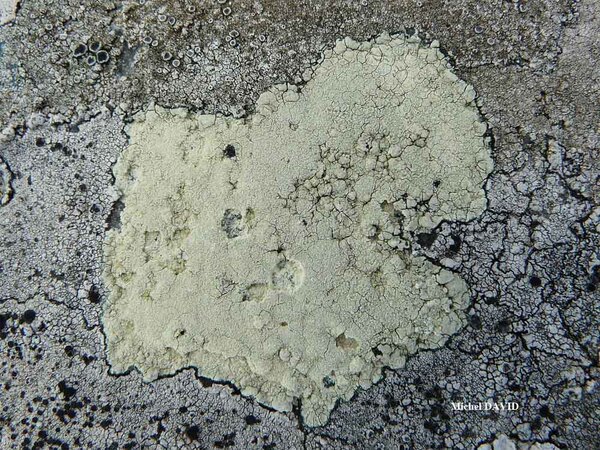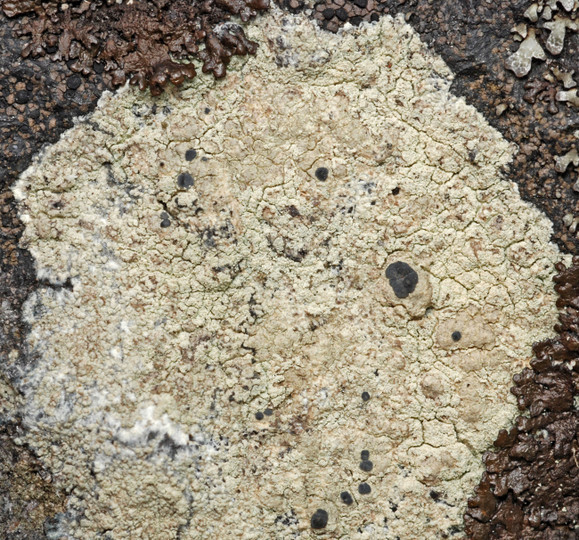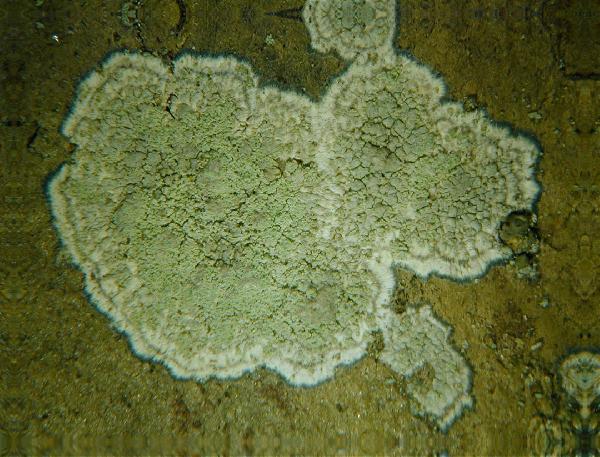Lecanora orosthea (Ach.) Ach.
Lichenogr. Univ.: 400, 1810. Basionym: Lichen orostheus Ach. - Lichenogr. Suec. Prodr.: 38, 1799.
Synonyms: Biatora orosthea (Ach.) W. Mann; Lecanora petrophila Th. Fr.; Lecanora sulphurea var. orosthea (Ach.) Flagey; Lecidea orosthea (Ach.) Ach.; Zeora orosthea (Ach.) Flot.
Distribution: N - TAA (Nascimbene & Caniglia 2000), Lomb. S - Si.
Description: Thallus crustose, episubstratic, rather thick, continuous to rimose-areolate, yellowish to yellowish green when dry, green when wet, sorediate, often delimited by a whitish to blue-grey prothallus. Soredia initially developing along the margins of the areoles, but soon becoming diffuse and covering the central parts of thallus. Apothecia rare, lecanorine, more or less immersed to sessile, 0.3-1(-1.5) mm across, with a pink-brown, greenish brown to finally grey-black, sometimes grey-pruinose, at first flat but soon convex disc, and a thin, soon excluded thalline margin. Epithecium green to brown, with granules dissolving in K; hymenium colourless, 45-65(-70) µm high; paraphyses mostly simple, the apical cells only slightly swollen; hypothecium colourless. Asci 8-spored, clavate, very thin-walled, with a K/I+ blue, tall tholus penetrated by a faintly amyloid apical cushion, the wall K/I-, surrounded by a blue outer layer, Lecanora-type. Ascospores 1-celled, hyaline, ellipsoid, 8-16(-20) x 3-7(-8) µm. Conidia needle-like, 13-22 x c. 1 µm. Photobiont chlorococcoid. Spot tests: K+ yellow turning brownish, C-, KC+ yellow to yellow-brown, P-, UV+ dull orange. Chemistry: usnic acid, variable amounts of skyrin and zeorin.Note: on surfaces of siliceous rocks protected from rain in upland areas; certainly more widespread in the Alps.
Growth form: Crustose
Substrata: rocks
Photobiont: green algae other than Trentepohlia
Reproductive strategy: mainly asexual, by soredia, or soredia-like structures (e.g. blastidia)
In underhangs rarely wetted by rain
Commonnes-rarity: (info)
Alpine belt: extremely rare
Subalpine belt: very rare
Oromediterranean belt: extremely rare
Montane belt: rare
Submediterranean belt: absent
Padanian area: absent
Humid submediterranean belt: absent
Humid mediterranean belt: absent
Dry mediterranean belt: absent
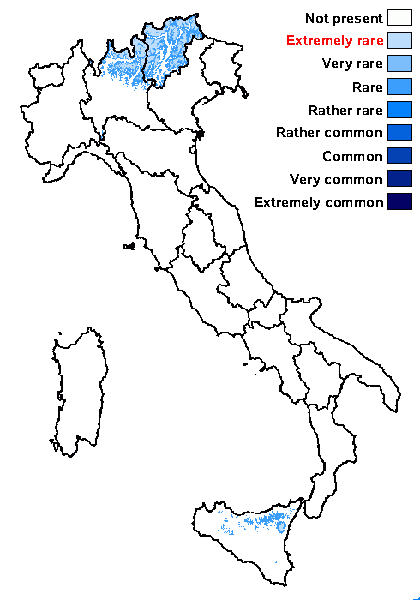
Predictive model
Herbarium samples
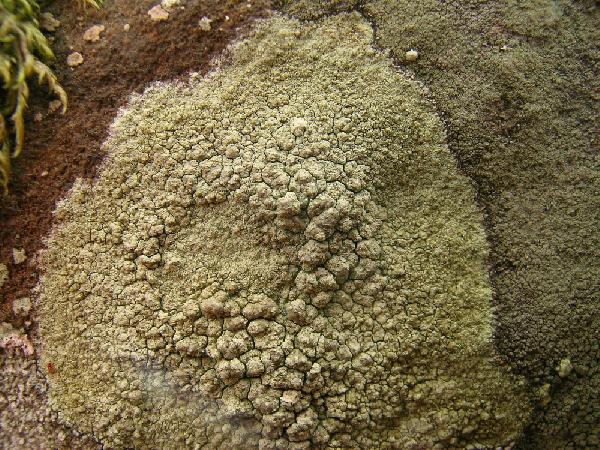
Ulrich Kirschbaum CC BY-SA 4.0 - Source: https://www.thm.de/lse/ulrich-kirschbaum/flechtenbilder
Central Europe; Germany; Hesse.
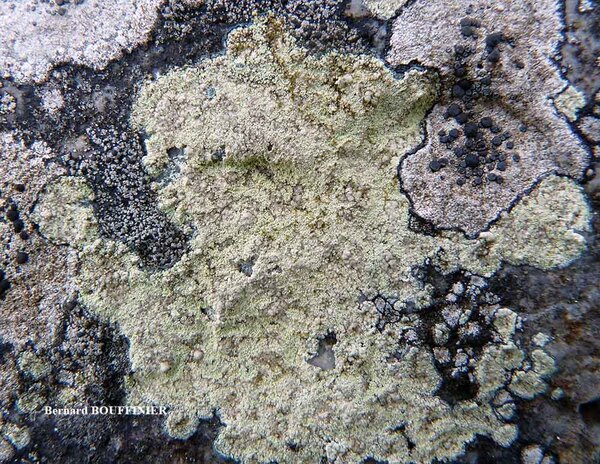
Bernard Bouffinier - Source: http://www.lichensmaritimes.org/index.php?task=fiche&lichen=154&lang=en
France, Crozon Ile Vierge
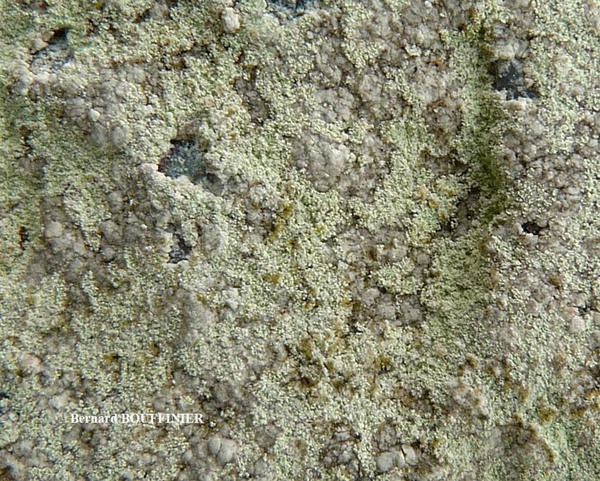
Bernard Bouffinier - Source: http://www.lichensmaritimes.org/index.php?task=fiche&lichen=154&lang=en
France, Crozon Ile Vierge
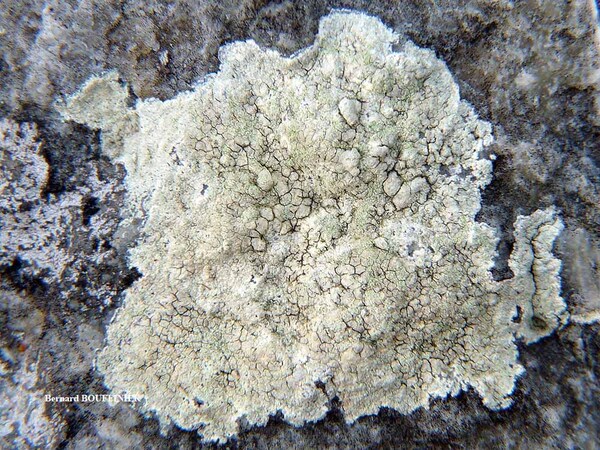
Bernard Bouffinier - Source: http://www.lichensmaritimes.org/index.php?task=fiche&lichen=154&lang=en
France, Crozon Ile Vierge
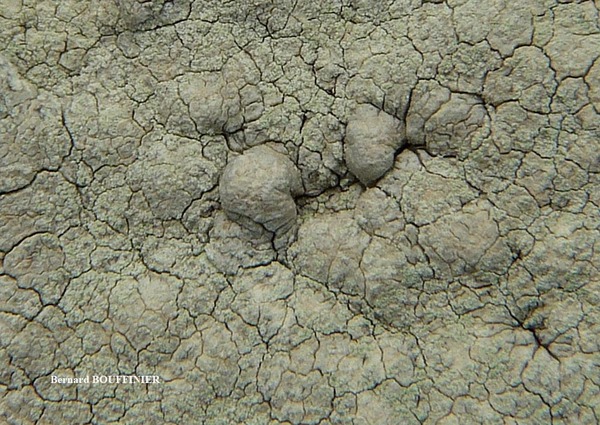
Bernard Bouffinier - Source: http://www.lichensmaritimes.org/index.php?task=fiche&lichen=154&lang=en
France, Crozon Ile Vierge
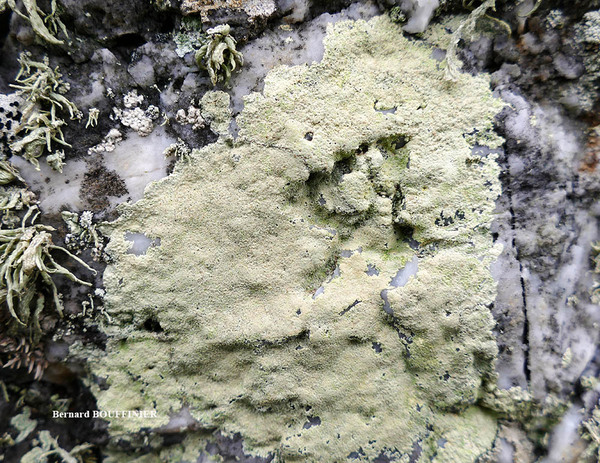
Bernard Bouffinier - Source: http://www.lichensmaritimes.org/index.php?task=fiche&lichen=154&lang=en
France, Quelern
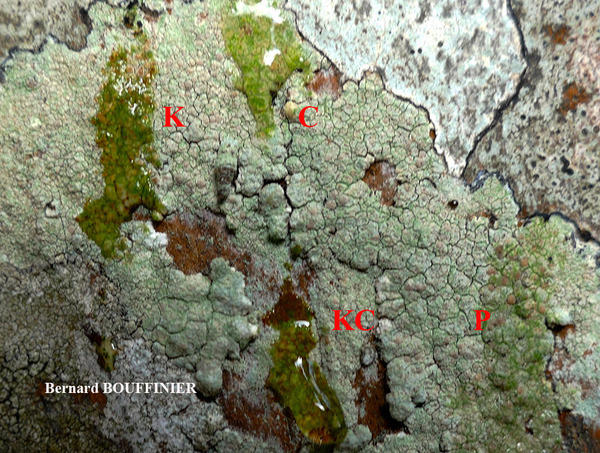
Bernard Bouffinier - Source: http://www.lichensmaritimes.org/index.php?task=fiche&lichen=154&lang=en
France, Trez Bihan
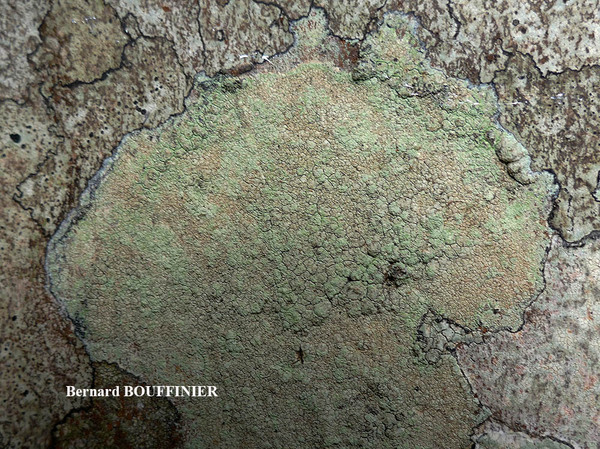
Bernard Bouffinier - Source: http://www.lichensmaritimes.org/index.php?task=fiche&lichen=154&lang=en
France, Trez Bihan
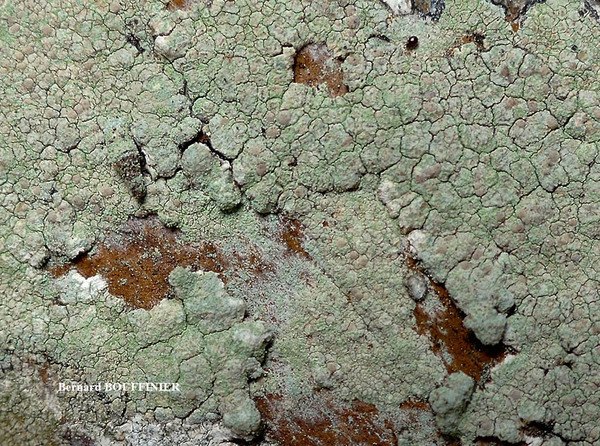
Bernard Bouffinier - Source: http://www.lichensmaritimes.org/index.php?task=fiche&lichen=154&lang=en
France, Trez Bihan
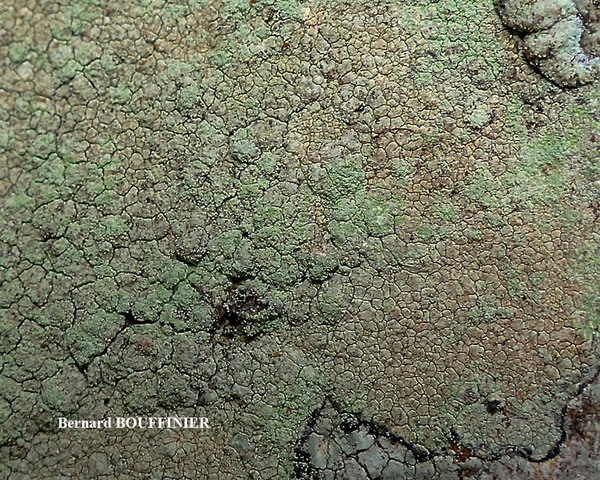
Bernard Bouffinier - Source: http://www.lichensmaritimes.org/index.php?task=fiche&lichen=154&lang=en
France, Trez Bihan
Growth form: Crustose
Substrata: rocks
Photobiont: green algae other than Trentepohlia
Reproductive strategy: mainly asexual, by soredia, or soredia-like structures (e.g. blastidia)
In underhangs rarely wetted by rain
Commonnes-rarity: (info)
Alpine belt: extremely rare
Subalpine belt: very rare
Oromediterranean belt: extremely rare
Montane belt: rare
Submediterranean belt: absent
Padanian area: absent
Humid submediterranean belt: absent
Humid mediterranean belt: absent
Dry mediterranean belt: absent

Predictive model
| Herbarium samples |

Ulrich Kirschbaum CC BY-SA 4.0 - Source: https://www.thm.de/lse/ulrich-kirschbaum/flechtenbilder
Central Europe; Germany; Hesse.

Bernard Bouffinier - Source: http://www.lichensmaritimes.org/index.php?task=fiche&lichen=154&lang=en
France, Crozon Ile Vierge

Bernard Bouffinier - Source: http://www.lichensmaritimes.org/index.php?task=fiche&lichen=154&lang=en
France, Crozon Ile Vierge

Bernard Bouffinier - Source: http://www.lichensmaritimes.org/index.php?task=fiche&lichen=154&lang=en
France, Crozon Ile Vierge

Bernard Bouffinier - Source: http://www.lichensmaritimes.org/index.php?task=fiche&lichen=154&lang=en
France, Crozon Ile Vierge

Bernard Bouffinier - Source: http://www.lichensmaritimes.org/index.php?task=fiche&lichen=154&lang=en
France, Quelern

Bernard Bouffinier - Source: http://www.lichensmaritimes.org/index.php?task=fiche&lichen=154&lang=en
France, Trez Bihan

Bernard Bouffinier - Source: http://www.lichensmaritimes.org/index.php?task=fiche&lichen=154&lang=en
France, Trez Bihan

Bernard Bouffinier - Source: http://www.lichensmaritimes.org/index.php?task=fiche&lichen=154&lang=en
France, Trez Bihan

 INDEX FUNGORUM
INDEX FUNGORUM
 GBIF
GBIF
 DOLICHENS
DOLICHENS
